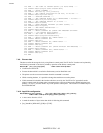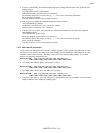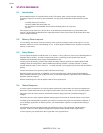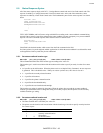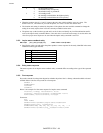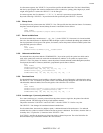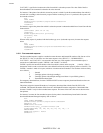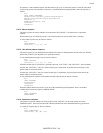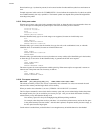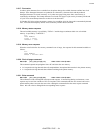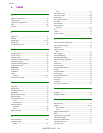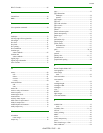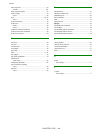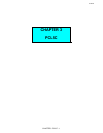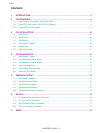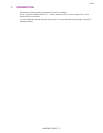10/10/03
CHAPTER 2 "PCL" - 100
Status location type 1 (selected at present) is an incorrect location for unbound font symbol sets and returns an
error.
Example responses in this section for "SYMBOLSETS=" do not indicate the complete list of symbol sets which
are available internally, but only a partial list . The internal symbol sets depend on the printer and might differ
according to the printer.
8.5.15. Entity error codes
When an out-of-range value exists in the command value fields, or when the entity is not supported or does not
exist, or the request is inadequate, the printer replies with one of four likely errors as follows:
Invalid Entity
Invalid Location
None
Internal Error
ERROR=INVALID ENTITY
When the identified entity type is not in the range or not supported, it returns an invalid entity error.
PCL
INFO ENTITY
ERROR=INVALID ENTITY
ERROR=INVALID LOCATION
When the entity type is correct, but the location ( the type, the unit, or the combination) is not, or when the
identified device is not installed, it returns an invalid location error.
PCL
INFO FONTS
ERROR=INVALID LOCATION
ERROR=NONE
When the entity type and location are correct, but there are not any entities of the identified type in the location,
or when the type is not correct for the identified entity, it generates the NONE error response.
PCL
INFO SYMBOLSETS
ERROR=NONE
ERROR=INTERNAL ERROR
The status response for some requirements could be quite big. When status replies are requested, it returns an
internal error if the printer runs out of memory as follows:
PCL
INFO SYMBOL SETS
ERROR=INTERNAL ERROR
8.5.16. Free space command
ESC*s1M (27)(42)(115)(48)(77) <1Bh><2Ah><73h><31h><4Dh>
The amount of memory which is free for use is returned by this command. Two values are returned: the total
amount of free memory and the largest block of free memory.
When you send a value other than 1, an error ( "ERROR = INVALID UNIT" )is returned.
The Free Space command is sent to check the free memory space and you can acknowledge whether the printer
has enough memory for a job or not before you execute your job. Also you can check the amount of memory
which an entity or any other data has already used.
Free memory space will always be changing during different printing conditions.
For example, when the printer receives print data, it is stored in the printer memory and so the free space
in the printer memory becomes smaller. After the data is printed, the printer memory becomes empty, so
the free space becomes larger again.
Certain action is needed when you decide there is not enough memory to hold the data to be downloaded.



